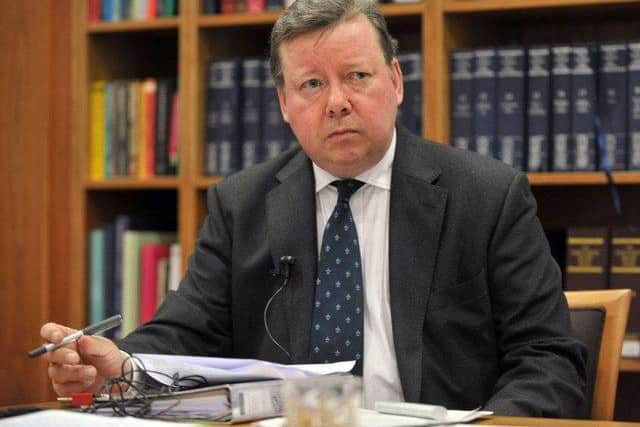Lord Carloway: Greater care must be taken in showing jurors 'horrific' mobile phone footage in court
and live on Freeview channel 276
Let us know what you think and join the conversation at the bottom of this article.
The Lord Justice General Lord Carloway made the remarks in a written judgement issued by the Court of Criminal Appeal in Edinburgh on Wednesday.
The judge said that repeated viewings of graphic video footage may negatively affect jurors.


Advertisement
Hide AdAdvertisement
Hide AdThe comments were made following a failed appeal which had been brought before the court earlier this month by convicted murderer Paul Smith.
Smith,44, failed in a bid to have his conviction quashed for killing Andrew McCarron,49, outside Edinburgh City FC’s social club in July 2019.
During Smith’s trial, jurors heard how pushed a knife into Mr McCarron's throat during a brutal assault.
The attack happened moments after Mr McCarron tried to intervene when Smith went after his ex-wife's partner at Edinburgh City FC's social club.
Advertisement
Hide AdAdvertisement
Hide AdThe court heard that Smith had gone out armed with a knife after months of sending threatening texts to his ex-wife, Nicola Johnstone, about her new partner Jamie Bell.
During proceedings, jurors were repeatedly shown footage of the sickening assault which had been captured on an eyewitness’s mobile phone.
In the judgement, Lord Carloway said judges and lawyers had to take great care in showing such footage as it may affect the well being of jurors.
Lord Carloway, who sat with colleagues Lord Malcolm and Lord Pentland wrote: “The images of the murder of the deceased as recorded on the mobile phone were horrific; showing in graphic terms the stabbing of the deceased and its fatal aftermath.
Advertisement
Hide AdAdvertisement
Hide Ad“Great care must be taken by both prosecution and defence when deciding whether it is necessary to show such images to members of the jury, and to others in the court room.
“It may be that some may be familiar with this type of image, but many more will not. The lasting effects of viewing such images may be significant. Those effects must be considered and guarded against.”
During his trial, the jury heard evidence of how Smith developed an "obsessive hatred" of Mr Bell in the days leading up to the fatal assault on July 21 2019.
Last week defence advocate Fred Mackintosh QC told the appeal judges that their colleague Lord Burns had made an error during Smith’s trial.
Advertisement
Hide AdAdvertisement
Hide AdHe said Lord Burns acted incorrectly in failing to allow jurors to consider that Smith had been provoked into stabbing Mr McCarron.
Mr Mackintosh said evidence in the case showed that in the moments before the fatal assault, Mr McCarron issued death threats to Smith. He said this would have entitled jurors to conclude that Smith was provoked into attacking Mr McCarron.
Prosecutor Roddy Dunlop QC said that Smith’s actions were “grossly disproportionate”.
He added: “To say there is a degree of proportionality between shouts and threats of that nature by a man who is holding his arms out; he is evidently unarmed - to say it is a proportionate reaction when a concealed knife is pulled out and plunged 15.5 centimetres into the neck severing major arteries and the like - that is simply untenable proposition.
“One could not get a more clear example of a grossly disproportionate reaction.
“There is no realistic possibility that a reasonable jury - looking at the evidence as a whole would heave return a verdict to a charge other than murder.”
The appeal court accepted Mr Dunlop’s submissions.
On Wednesday, Lord Carloway said that it was “doubtful” that the mobile phone footage at Smith’s trial had to be played repeatedly.
Advertisement
Hide AdAdvertisement
Hide AdHe said that if a similar situation was to arise in the future, lawyers should make submissions about why such videos should be repeatedly played to jurors during procedural hearings.